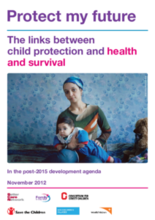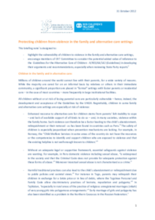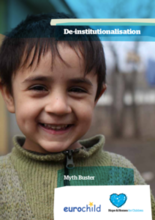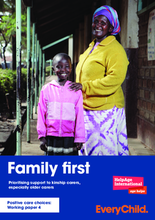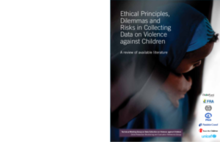Displaying 1121 - 1130 of 1321
This inter-agency paper was written by Family for Every Child, Better Care Network, Consortium for Street Children, Save the Children, SOS Children’s Villages, and World Vision, for submission to the United Nations consultation: ‘Health in the Post-2015 Development Agenda.’ It examines the links between child protection and health and argues for a continuing focus on health and child survival that encompasses particular goals and indicators on children’s protection.
This briefing note, produced by an Interagency Working Group on children without parental care, is designed to highlight the vulnerability of children to violence in the family and alternative care settings, and to encourage members of the CAT Committee to consider the potential added value of reference to the Guidelines for the Alternative Care of Children.
This article reviews the U.S. Government Evidence Summit on Protecting Children Outside of Family Care held in December 2011 in Washington D.C. The Summit brought together more than 150 of the world’s leading advocates for children to examine the strength of the research evidence on existing programs and interventions, and most importantly to identify critical knowledge gaps and areas where more research is needed so that systems and programs designed to improve the overall health and well-being of these vulnerable children may be strengthened.
The purpose of this review was to identify evidence-based early response strategies and interventions for improving the outcomes of children outside of family care, including children of and on the street, institutionalized children, trafficked children, and children affected by conflict and disaster, and who are exploited for their labor. A conclusion was drawn that there is a strong need for strengthening the evidence base regarding the effectiveness or early assessments and responses to children living outside family care and for using evidence to guide operational policy and practice.
This briefing paper seeks to address key misunderstandings about de-institutionalisation. It explains what it is and what it is not and addresses key questions often asked about the need for such institutions, the role they play and the impact of this transformation and what it entails.
The paper calls for greater prioritisation to be given to supporting kinship carers and the children in their care, including ensuring such households are able to access social protection, and receive psycho-social and health care support and assistance with education where needed.
The lack of care and protection facing children is a global crisis with billions of children experiencing abuse, neglect or exploitation, and many millions growing up outside of families, on the streets or in harmful institutional care. This lack of adequate care and protection is commonly the result of inequalities. Children without adequate care and protection are stigmatized and have inequitable access to basic services which, severely diminishes life chances and creates a spiral of disadvantage. In order to break this spiral, the authors of this report recommend a three-pronged strategy.
The literature review, “Ethical Principles, Dilemmas and Risks in Collecting Data on Violence against Children” aims to capture current thinking around ethical issues and provide empirical support to guide recommendations for ethical research practice and decision-making in collecting data on violence against children (VAC). The review examines documentation that is of specific relevance to research ethics in collecting data on VAC and includes ethics guidelines, codes, protocols and practice related documentation, as well as research-based publications.
In this report, Retrak examines the situation of girls living on the streets in Kampala, Uganda and Addis Ababa, Ethiopia, and provides key recommendations on the development programs required to address their needs. The report urges for scaling up services, building new facilities for street girls, and building staff capacity to handle issues related to this population.
Virginia Commonwealth University Professors, Karen Smith Rotabi and Rosemary Farmer, examine impact of neglect on brain development in their recent podcast, Orphaned and Vulnerable Children and Brain Development. Through the persepective of the intersection of neuroscience and social welfare practice, Farmer and Rotabi examine how poverty of experience and such potential adverse situations as institutionalization disrupt brain development in babies and young children.

